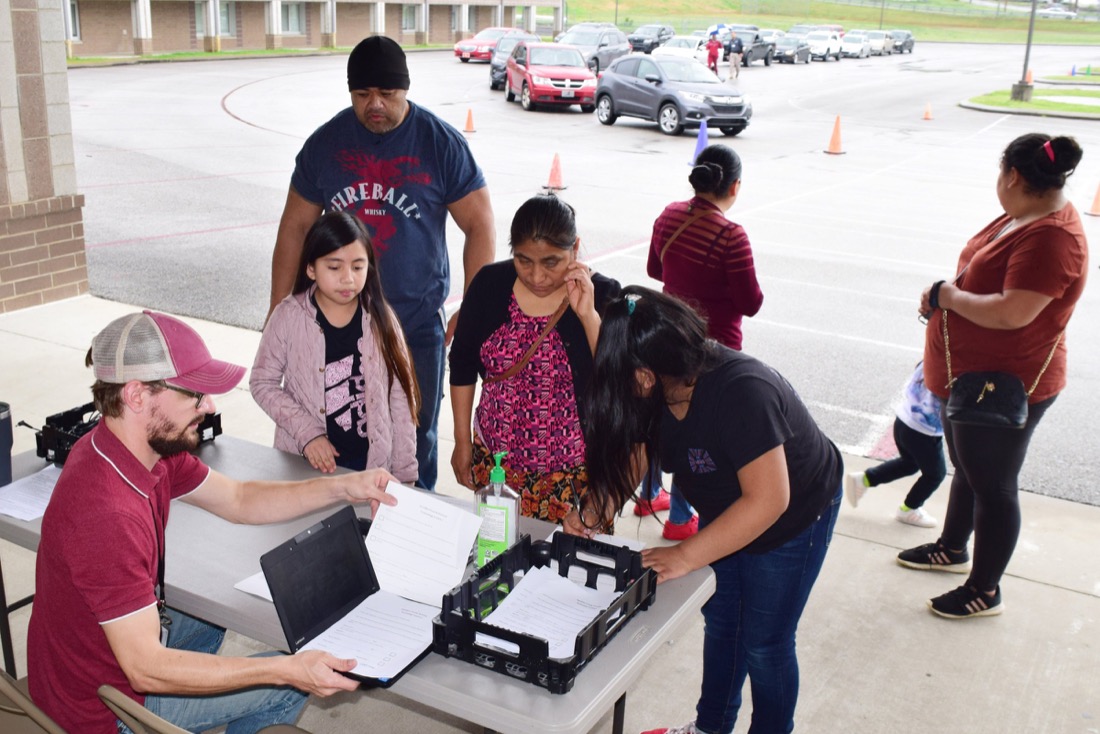While schools are closed for weeks in response to the coronavirus pandemic, area educators are still trying to ensure students are learning.
Some teachers are creating videos of themselves reading books aloud for their littlest students, while others are scheduling video chat hangouts or sending links to a myriad of online learning resources.
But before the outbreak, only middle schools and some high school programs in Hamilton County were "one-to-one" - meaning all students had their own personal laptop or tablet to use.
Hamilton County Schools has been scrambling to ensure all students, at least from grades 3-12, have a technological device. The Chattanooga Area Chamber of Commerce, Chattanooga 2.0 and local businesses have stepped up to help them.
Several area businesses committed a total of $100,000 to buy technology devices for Hamilton County Schools students, and EPB will be installing 25 mobile community-based internet hot spots, the groups announced Monday.
EPB's new "quick connect" wireless internet locations will be hubs set up mainly in school or church parking lots, according to J. Ed. Marston, vice president of marketing for EPB.
The hope is that people will drive to the access points in their cars to log onto the Wi-Fi for a period of time.
"The concept is basically people would drive their cars and park and use this service while they're in their cars," Marston said. "As you can imagine, the challenge on short notice of providing internet access from an equipment perspective and other things is not something anyone could easily do."
EPB, like other community groups, is working with the school district and Chattanooga 2.0 on a "holistic approach" to providing options and resources for students and families, he said.
"The more we can support families in continued, at-home learning while schools are closed, the safer and more resilient our community will be," said Molly Blankenship, executive director of Chattanooga 2.0, in a news release. "It's encouraging to see our community thinking creatively about solutions."
The collaboration was inspired by organizing efforts such as We Over Me Chattanooga and overall community support, and the organizations are working together to make sure students can still learn while school buildings are closed during the COVID-19 crisis, the news release states.
Unum, BlueCross BlueShield of Tennessee, Tennessee Valley Federal Credit Union, Coca Cola Bottling Company United, First Horizon, TVA and Bridge Public Affairs are among the businesses that came together to provide funds to buy more Chromebooks for Hamilton County students.
"This collaboration provides hope to so many families," said Christy Gillenwater, president and CEO of the Chattanooga Chamber of Commerce. "We are grateful to these creative businesses and foundations for focusing on students, namely given the challenging landscape currently facing all organizations."
With increased access to the devices, the next challenge will become actual internet access for students and families so they can use these devices to engage in distance learning, community leaders agree.
Only about 75% of Hamilton County homes have broadband access, including data service via mobile phones, and in surrounding counties that number is even lower.
That lack of access can have dire consequences for children, according to the Associated Press. Students with home internet consistently score higher in reading, math and science, and the homework gap in many ways mirrors broader educational barriers for poor and minority students.
Now, with more students and workers online for the foreseeable future, those consequences can have even bigger impact.
Typically, students and families might use public libraries or Chattanooga's Youth and Family Development Centers to gain internet access, but those and other businesses have been shut down during the pandemic.
The city of Chattanooga, the Benwood Foundation, Chattanooga 2.0, the University of Tennessee at Chattanooga, the Enterprise Center and EPB are working together on other efforts to boost community-based internet access to support students and families in distance learning, as well, according to Blankenship.
In addition to the 25 quick-connect sites, EPB said there is the potential the utility company could add an additional 25 if they notice significant use. The locations of the spots will be released in the coming days, Marston said, as they are finalized. Hamilton County Schools is also helping families and students find the sites.
The quick-connect spots will cover an area of up to 250 feet in diameter, and if usage warrants it, EPB might add more equipment to enlarge the area, Marston said. The school district will provide signs and instructions for logging on and use.
Marston did not say whether EPB has plans to offer free service to students or families anytime soon.
Comcast and Charter Communications are already offering two months of complimentary free broadband services to low-income families and students and have pledged to open up more free Wi-Fi hotspots to help with online instructional programs.
AT&T and Comcast also are both suspending usage caps on their broadband services for at least a couple of months.
Hamilton County Schools has been collecting unused devices from across the school district and loaning them to students who might not have a device.
"Teachers and students have risen to the challenge of continued learning from home, and I am astounded by the new ways they are connecting and learning," reads a statement from Superintendent Bryan Johnson. "This response from the community truly demonstrates that we are better together, as businesses and organizations have gotten involved in such an important way to provide more opportunity for our students to stay smart while our school doors must remain closed."
The district is also helping families find out what resources might be available to them and their students.
For more information, call 423-493-0350 or visit www.hcde.org/hcs-continued-learning.
Contact Meghan Mangrum at mmangrum@timesfreepress.com or 423-757-6592. Follow her on Twitter @memangrum.


